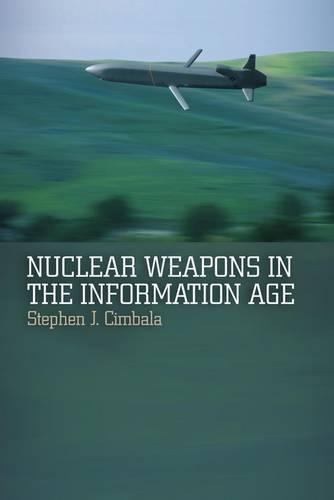
Nuclear Weapons in the Information Age
(Paperback)
Available Formats
Publishing Details
Nuclear Weapons in the Information Age
By (Author) Stephen J. Cimbala
Continuum Publishing Corporation
Continuum Publishing Corporation
5th April 2012
United States
Classifications
Professional and Scholarly
Non Fiction
International relations
Nuclear weapons
327.1747
Physical Properties
Paperback
248
Description
In today's information age, the coexistence of nuclear weapons with advanced conventional weapons and information-based concepts of warfare is a military contradiction.
Nuclear deterrence was initially predicated on geopolitical, military, and technical assumptions. These were based on Cold War politics, rational deterrence theory, the concept of mutual vulnerability, and the fact that information and technology diffusion were limited. Today, however, far from being obsolete, nuclear and other weapons of mass destruction have not only survived, but have become weapons for states that face security threats, including perceived threats of nuclear blackmail, or expectation of conflicts. This study focuses on this unplanned coexistence of two distinct arts of war, including the possibility that states like the U.S. may be held hostage to nuclear blackmail by "outlier" regimes or terrorists, such as North Korea. It shows that restricting nuclear proliferation should still be on the agenda of policymakers, and calls for a revitalized global nonproliferation regime.
This unique survey by a leading expert will appeal to anyone interested in arms control, nuclear proliferation, and defense policy.
Reviews
The central thread which runs throughout the book is nuclear deterrence, and the fact that the possibility of a nuclear war coexists uneasily with conventional warfare based on information principles and advanced cyber technologies. [...] [The book] provides a well-written, detailed historical account of the United States and Russia in terms of their relationship, their policies and possible future scenarios. -- Priyamvada Mishra, Symbiosis Law School, India * Political Studies Review *
"In this well written and insightful study, Steve Cimbala demonstrates that even after the end of the Cold War, nuclear weapons still have a critical impact on peace and security. A must read for analysts and policymakers dealing with arms control and nuclear proliferation." -- Lawrence J. Korb, Senior Fellow, Center for American Progress
"No author since Bernard Brodie and Henry Kissinger has done more to advance our understanding of nuclear weapons issues than has Stephen J. Cimbala. His latest foray into this intellectual thicket, Nuclear Weapons in the Information Age, continues in the same tradition. His discussion of the uneasy coexistence between nuclear and information-based weapons is path breaking and takes account of the importance of long range precision strike and cyber warfare issues. He breathes new life into the old topic of the interdependence of U.S.-Russian nuclear arms control, nonproliferation, and missile defense, and considers both their conceptual structures and policy implications. Well-written and insightful, this book will be interesting to both professional and lay audiences focused on these issues. It should be required reading for policy makers, yet will also be useful as a textbook for undergraduate or graduate classes in national security policy." -- John Allen Williams, Professor of Political Science, Loyola University Chicago, USA, and Chair and President, Inter-University Seminar on Armed Forces and Society (IUS)
Author Bio
Stephen J. Cimbala is Distinguished Professor of Political Science at Penn State Brandywine and the author of numerous works in the fields of national security studies, nuclear arms control and other fields, including Multinational Military Intervention: NATO Policy, Strategy and Burden Sharing (with P. K. Forster, Ashgate, 2010). An award winning Penn State teacher, Dr. Cimbala has consulted for various U.S. government agencies and defense contractors.
